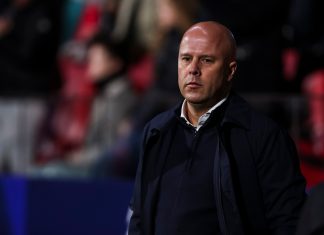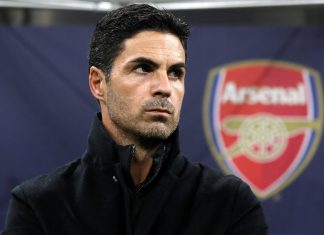Simply stating the name of the Chelsea centre back does not do justice to his status as a warrier and bastion of all that is good about the game, and English football. He is England’s Brave John Terry.
And so it seemed apt when ‘The Brave One’ was reinstated this week as England’s latest permanent captain under Fabio Capello, the Italian who professes not to care about the captaincy, yet felt suitably moved as to need to alter the identity of the player holding the piece of fabric. Which incidentally, means about nothing. Why we seem to get so worked up over this rather overstated honour is a mystery to those outside this island. It was a mystery to Capello too once.
The ideal solution to England’s captaincy problem is remarkably simple. It is to just give the armband to the player on the pitch who has the most appearances for England, and to sit down those fans deprived of their idol of a blood stained iconic warrier in front of a Terry Butcher/Paul Ince highlights reel to satisfy their bizarre desire to see grown men throwing themselves around haphazardly.
But if we are going to keep the permanent captain, John Terry is the wrong player to hold it. It is not that he can’t lead – though sleeping (allegedly) with the mother of a team mate’s child probably is not high up on the list of the leadership manual – but because his reappointment sends out an awful message.
If anyone missed possibly the most interesting of England’s Brave Jon Terry’s comments yesterday, it was possibly this.
“I accepted their decision. But that doesn’t mean to say I agreed with it, and I never will.”
The problem here is obvious. Terry is in a position that millions would wish to enjoy, yet he has demonstrated that you can refuse to recognise when you are in the wrong, yet still be rewarded with the return of the armband.
And as for the rest of the squad? It’s hard to worry too much about Rio Ferdinand’s mental state, though we all owe ‘The Injured One’ a huge thanks for his gracious decision to continue playing for his country in spite of Capello not talking to him face to face.
It’s hard to imagine that Terry’s predecessor, David Beckham, would have indulged in the kind of histrionics and frankly, immature whining, that his predecessors seem to engage in. The more distant Beckham becomes from the England camp, the more his importance and class is noticed, and missed.
The other major issue which arises from returning the captaincy to Terry is a footballing one. He is not anywhere near as good at the game as most seem to think. Granted, he’s a decent defender – well above average – but his abilities have been exaggerated over the years by his desire to show how far he will risk life and limb for Chelsea and England, and the admitted fact that he is quite good at leading a team, that is when he isn’t busy with his team mate’s partners (or ex partners).
Suddenly, he has rediscovered his form for Chelsea after a poor season. Coincidentally, this happened after the arrival of David Luiz, and it is his best form since the departure of Ricardo Carvalho. Terry’s issue is that he has never been very good unless partnered by a quick, intelligent centre back who is capable on the ball. Like Luiz, or Carvalho. Terry is neither quick nor possessing of any real technique. And most of all, he lacks the intelligence required for the top, top level. Players like Xavi, Zidane and Messi have dominated world football in recent times because most of all, they are supremely intelligent on the football field. They see things before they happen, they can anticipate where space will open up and where it will be closed down – and as the astute Jonathan Wilson observed, football tactics are based on the manipulation of space. It is why Wayne Rooney has been so effective over the years for England; he more than any other England player of recent years knows where space will open up. In defence, Ferdinand has always possessed supreme anticipation of where space will open up for opposition strikers, which is why he is still so effective when fit despite losing some of his pace. It was why Paolo Maldini remained at the top level even in his late 30s – he was always one step ahead in the mind, and his positioning was therefore first class. Terry has never possessed this ability. As such, he has always been out-thought at international level by quicker and more intelligent attacking players. Though it is easy to think of games he has performed superbly in for Chelsea over the years, it is harder with England. The only game that springs to mind was for England in the 2004 World Cup, against Sweden, throwing himself at crosses. But faced with the quick-witted Germans in the last World Cup, or the movement of the Croatians and Russians in the last failed European Championships qualification period, he floundered.
He may be able to lead, but handing Terry the captaincy sends out an awful message. And it also indicates the intention to field the Chelsea star for the foreseeable future, despite age catching up on him. And the main problem with this is that without Rio Ferdinand alongside him in defence, as is likely to happen, Terry’s flaws will once again be shown up at the highest level, as they are for Chelsea when he is not partnered by a defender good and intelligent enough to cover up his weaknesses.







